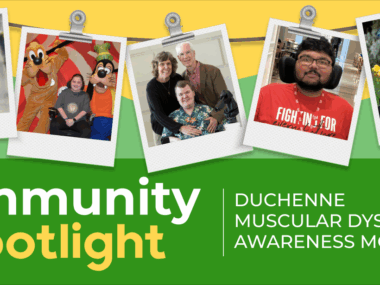Reflecting on how Duchenne MD changed my life for the better
The condition has not only benefited me, but also my family and community
Written by |

As I look forward to the year ahead, I’m filled with a mix of emotions: unbridled joy at the thought of spending my first Valentine’s Day with my girlfriend, Amanda; a sense of dread as my caregiver Glenda leaves in July; and the euphoria of turning 29 in October. Writing this column reminds me of how far I’ve come because of Duchenne muscular dystrophy (DMD), not in spite of it.
Duchenne is often described in negative terms. It’s regarded as a cruel twist of fate for patients and their families. I can recall my parents recounting to me how crestfallen they were when they found out from doctors that I’d be following in my brother Isaac’s footsteps by inheriting the condition. Knowing the bleak prognosis of DMD, my parents prayed for Isaac’s divine healing for years, to no avail. The final nail in the coffin came in 2019, when Isaac passed on.
The surgeon who successfully operated on me to correct my congenital hydronephrosis, a potentially life-threatening defect that affects the renal system, even told my dad before surgery to reconsider putting me through the procedure. Even if the surgery on both kidneys was successful, the surgeon explained, I might not have that long left in the world anyway because of DMD. Nevertheless, my parents persevered with the difficult decision, and the rest, as they say, is history.
While I’ll forever be grateful to that doctor for saving my life as an infant, I remain troubled by the conversation he had with my father. When I was in utero, abortion could have been on the table if my mum’s chorionic villus sample hadn’t been contaminated in the lab and come back negative for DMD. I have always questioned why society regards Duchenne as something we must rid the world of at all costs.
What Duchenne has given me
DMD has taught me that going through physical adversity and emotional suffering doesn’t have to be all doom and gloom. Through the vicissitudes of my life with Duchenne, as tricky as they have been, I’ve grown in my character and become a more resilient person. Without the condition, I wouldn’t be who I am today — a voice for those with rare diseases. As much as Duchenne has benefited and enriched my life’s journey, it has also inspired and instilled hope in my family and community.
My parents’ hearts and minds have been renewed for the better because of it. My sister has told me that our shared tenacity when faced with adversity has made her a stronger person. Many people I’ve encountered in my 28 years have shared how my story has touched their lives and encouraged them to conquer their own school of hard knocks.
So is it hopelessly tragic to live with Duchenne in this world? I’d respond to that with a resounding no. What’s tragic is when, by focusing only on the negatives of this condition, we fail to realize the good that can come from the profound lived experiences of the people it affects.
While I applaud those in the medical and patient advocacy fields — such as Elijah Stacy, founder of the nonprofit Destroy Duchenne — for relentlessly pushing for a cure, I also acknowledge that my personal view about the rare disease may be an unpopular one, especially among other patients.
Most would probably argue that the excruciating pain and the struggles that Duchenne inflicts upon them far outweigh any possible hope, joy, strength, and inspiration the condition can bring to humankind.
As a patient-survivor who has almost succumbed to the disease many times, and who lost a brother to it, I can relate to where they’re coming from.
But looking back, I wouldn’t have the life I’ve enjoyed without DMD. The beautiful depths of my brotherhood with Isaac, the deeper love I have for my parents and sister, the solidarity I share with Glenda, and the emotional intimacy I’ve been searching for all my life in my soulmate, Amanda, have all been made possible by DMD.
As I brace myself for the challenges that lie ahead for me this year, I’m reminded of the final lyrics of “For Good” from the popular Broadway musical “Wicked”: “Because I knew you/ I have been changed/ For good.”
This is my tribute to Duchenne, my lifelong partner in crime.
Note: Muscular Dystrophy News Today is strictly a news and information website about the disease. It does not provide medical advice, diagnosis, or treatment. This content is not intended to be a substitute for professional medical advice, diagnosis, or treatment. Always seek the advice of your physician or another qualified health provider with any questions you may have regarding a medical condition. Never disregard professional medical advice or delay in seeking it because of something you have read on this website. The opinions expressed in this column are not those of Muscular Dystrophy News or its parent company, Bionews, and are intended to spark discussion about issues pertaining to muscular dystrophy.







Leave a comment
Fill in the required fields to post. Your email address will not be published.